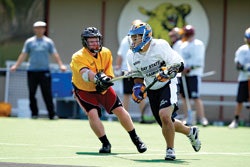Organizers of State Games competitions battle through the worst of the economic downturn.
 STRATEGIC SLASHING To keep the Bay State Summer Games afloat in Massachusetts, organizers have had to cut annual expenses of all kinds, including opening ceremonies.
STRATEGIC SLASHING To keep the Bay State Summer Games afloat in Massachusetts, organizers have had to cut annual expenses of all kinds, including opening ceremonies.April 3, 2009, was a gloomy day for the Empire State Games. It was then that the New York State Office of Parks, Recreation and Historic Preservation, citing an unprecedented "financial crisis" of the state budget, officially pulled the plug on the 2009 Summer Games. That ended months of speculation as well as a continuous 30-year run of Olympics-style competition for youth athletes, the longest of its kind in the nation.
Considering some 30,000 athletes and their families, state employees, politicians, sponsors, host communities and venues were affected by the announcement, Empire State Games director Fred Smith says he heard every imaginable reaction. "It's been more than three decades that these Games have been a part of this state," says Smith. "Sometimes the feedback was nasty, sometimes it was reasonable, and sometimes it was just, 'What a shame.' But everybody seemed to be pretty vocal about what they thought we should have done differently, or what the state should have done differently."
Fact is, there wasn't much that could have been done. Since 1978, the state Legislature had fully funded an appropriation in the state parks budget designed to cover virtually all of the Games' operational expenses, which held steady in recent years at just over $3 million. And it wasn't until last April that Smith and his staff discovered that the appropriation had been cut entirely. As Smith puts it, "We knew we were going to have to tighten our belts last year, but we didn't know we'd be losing our belts entirely - and our pants, too."
Belt-tightening has been a common theme among the 40 organizations currently operating State Games, according to Barclay Kruse, president of the National Congress of State Games, the nonprofit organization affiliated with the U.S. Olympic Committee that supports State Games organizers. But despite the economy and the blows it's been dealing to youth sports programs such as New York's, Kruse is one of many organizers throughout the country who remain upbeat. (For the record, the Empire State Games are back in full for 2010, with help from partially restored state funding and more aggressive sponsorship and fundraising plans.)
"I believe that as a group we are among the most creative and innovative organizers out there in programming our events," says Kruse, who also acts as director of Minnesota's Star of the North State Games. "In some ways, we're positioned pretty well to ride out a tough economy. At our national symposium last fall, there was actually quite a bit of optimism. People were generally happy with the programs they ran and the numbers were pretty good."
The situation in New York was extreme, in large part because the Empire State Games have benefited from a funding model in which the state has covered the lion's share of operational costs. A small handful of other State Games organizations - the Bay State Games (Massachusetts) and the Keystone State Games (Pennsylvania) among them - receive some direct state funding, yet most get no financial help whatsoever from their respective Legislatures.
 TIME TRIALS The 2009 Empire State Games were canceled after New York officials announced a lack of funding mere months before the games were scheduled to begin.
TIME TRIALS The 2009 Empire State Games were canceled after New York officials announced a lack of funding mere months before the games were scheduled to begin."State funding may have been the model early on in the movement, but most states have long since moved away from it," explains Kruse. "Most State Games are now stand-alone nonprofit corporations that aren't at any risk of losing state money because they aren't receiving any." But, Kruse adds, "The economy is an entirely different animal," one he says has had a dramatic impact on State Games organizations.
Kruse contends the youth sports marketplace has become so crowded - regardless of the recession - that it has forced State Games organizers to refine their operations in recent years. "Our numbers in Minnesota last year were down a little bit, but I don't know how much that had to do with the economy," Kruse says. "I think you'll see this trend reflected nationally: Some of our biggest sports have suffered some fragmentation because of different programs popping up that have divided the market a lot. If you go back 12 years, we were by far the biggest summer basketball tournament in Minnesota. Then AAU took off, as did programs that were mimicking those models, and now there are probably seven or eight major basketball programs each summer. The pie is divided a lot more."
Still, Kruse did witness some direct negative effects of 2009's economic conditions on Minnesota's Summer Games, particularly in track-and-field participation. "Many of those kids come from inner-city clubs in Minneapolis and St. Paul, where there is an active bunch of people doing some great programming," he says. "Unfortunately, they didn't have enough money last year to rent the buses required to bring those kids to the meet, which was about 80 miles away. They just couldn't afford it."
Kruse maintains that such examples have, thankfully, been few and far between. In fact, he and other State Games organizers agree that the relative proximity of State Games competitions to their athletes is what has helped many Games stay afloat, as other tournament organizers attempting to draw from a nationwide talent pool have suffered.
"I know a lot of states adopted marketing campaigns that said, 'Stay local. Play local,'" says Bay State Games director Kevin Cummings, who had to deal last year with the loss of approximately 35 percent of his organization's operating budget, including a $400,000 cut in state funding through 2009 and 2010. "We tried to promote to people that we are offering opportunities locally that provide media exposure and exposure to college scouts. These are mantras we've been promoting for years, but I think they seemed to have hit home with people more this year than they have in the past."
Evidence that the "stay local" message reverberated among Bay Staters is that participation increased from 2008 to 2009 in 21 of the 25 Summer Games sports, in some instances dramatically. Cummings believes the numbers in Massachusetts and at other State Games last summer also suggest that youth sports are remaining a priority for discretionary spending among families. "People talk about how they need to focus on the essentials in this economy and cut back on the frivolous things," Cummings says. "It appears, based on what we're seeing, that kids' participation in sports is still making that top-tier list. People may just be more economical in making the decisions about where their kids compete."
State Games, as nonprofit entities, have also benefitted from the fact that they can maintain relatively affordable participation fees, something organizers have underscored in their marketing messages during the downturn. Most organizations even run some form of scholarship program for aspiring athletes who are economically disadvantaged.
 INSIDE GAME Restoring New Yorkers' faith in the financial security of the Empire State Games has been one of the organizers' biggest challenges.
INSIDE GAME Restoring New Yorkers' faith in the financial security of the Empire State Games has been one of the organizers' biggest challenges.In Minnesota, where Kruse says revenue is more heavily reliant on participation fees than it is on corporate sponsorships - a strategy that he believes creates a more stable revenue stream in the long term - fees remain comparable to or somewhat lower than those charged by competing youth sports tournament organizers. "There is no uniform strategy or national policy for fees in this economy. It's very much up to each individual state," Kruse says. "But my take is that State Games have, historically, been affordable. I know it's a competitive market, but we don't want cost to ever be the issue that makes or breaks the decision to participate."
The problem arises, however, when corporate sponsorships dwindle, a reality that virtually all State Games have faced over the past two years. "Corporate dollars are just so hard to go after in this type of economy," says Cummings. "They're not rebounding, so far, so we're trying to be realistic in our approach. We're looking for any benefit. If there's not a cash contribution, any in-kind contribution that can get rid of a bottom-line expense is just as good for us."
In the meantime, organizers are finding ways to trim costs - from canceling opening ceremonies to not providing as many uniforms to discontinuing free T-shirt giveaways. "We knew we were going to have to cut back on a few things that made the Games special," Cummings says. "As we explored those decisions, we considered the questions, 'Does this diminish the athlete experience?' and 'Does it cause people to not want to be a part of our event?' We agonized for a long time over those."
For Cummings, that economy-induced agony provided two helpful revelations. First, "we learned that there's a big difference between what we as an organization thought was important to the athletes and what the athletes themselves considered to be important," he says. "When we cut our opening ceremonies, we thought, 'Uh-oh, this is the most important thing to people about the Games.' But we found out that it wasn't. You have to survey your participants and find out what the key elements are that make the Games important. Don't assume that you already know what they are."
Cummings' second revelation was that this type of economy breeds a certain compassion among everyone when cuts are required. "People understood our decisions, because the economy isn't just affecting us, it's affecting them," he says. "Everyone is feeling the pain. There was almost a sense of appreciation that we were going forward with the event at all."
Even though New York had to cancel its Summer Games last year, Smith notes that the Empire State Games moved forward with the Winter Games, Senior Games and Games for disabled populations. While Summer Games do tend to grab the most participants and the most media attention, organizers at Games throughout the country tend to credit a year-round diversity of program offerings with building a given Games' brand and positioning it for sustained success.
 DEFENSIVE POSITIONING Convincing state Legislatures of the positive economic impact created by State Games is an ongoing process in states such as New York, Massachusetts and Pennsylvania.
DEFENSIVE POSITIONING Convincing state Legislatures of the positive economic impact created by State Games is an ongoing process in states such as New York, Massachusetts and Pennsylvania."There's been a lot of energy invested in moving away from putting all our eggs in one basket - that one or two weeks during the summer," says Kruse. "People are inventing new tournaments and festivals, and creating other revenue sources that can help mitigate financial losses that may be happening in one area."
Citing programs that focus on non-sports issues such as childhood obesity, weight loss, tobacco use prevention, sportsmanship, youth leadership and sports medicine, among others, Cummings says State Games everywhere have "fought a battle for many years to try to not be known only as a sporting event."
"It's important for the state, as well as the grant suppliers and sponsors, that you be well-rounded," Cummings says. "Sure, the sporting events bring thousands of people to the table every year, but then we can interlay a program on sportsmanship or on youth fitness. That broadens your base and allows you to reach a much larger audience, both in terms of participants and supporters."
Especially in this economy - in which host venues, sponsors and politicians tend to be wary of financial commitments - public relations is indeed a big part of any State Games organizer's job. New York's Smith, for one, has stayed busy just convincing interested parties that the Empire State Summer Games are, indeed, a go this year.
"Because the Games were pulled out from under us so late last year, there is some trepidation out there," Smith says. "This is a very pivotal year for us. We have to announce that we're back and we're running a very good program, and we have to make sure that everybody up and down the line understands that - from the athletes and coaches to the sponsors to the host cities and even potential host cities. All of the programs are secure for this year, so now we're trying to build on that and make sure that future Games are secure."
And no matter how well positioned a State Games may be within the youth tournament marketplace, such security may be hard to come by for anybody in this economy. Smith, who's spent more than two decades helping run the Empire State Games, including 15 years as director, offers a broad perspective, despite the very real challenges facing him and his staff this year.
"People are reading the newspapers and they see that money may not be there for education, for health and human services, for basic transportation needs," Smith says. "As much as I personally love the Games, I do understand that there are more important things in the world. But, I believe we should always find a way to run a program that is not only near and dear to New Yorkers, but that is also providing a positive economic impact to local communities. We feel like we're a bargain, not a drain."




































